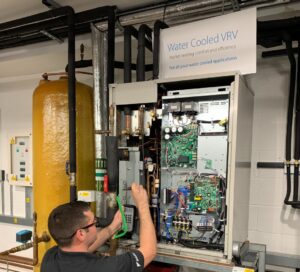North Yorkshire County Council has been approaching the reduction of carbon emissions in schools in a unique way. Peter Bell, schools carbon reduction officer, explains more.
Faced with the challenges of a rural county a similar size to Luxembourg, the council soon discovered that the buildings causing the largest carbon footprints were schools. Reducing their emissions was essential and we knew we’d need an innovative approach to engage schools in energy efficiency and support the environmental curriculum.
If you want a school to affect change it is primarily the children you need to engage as not every time-pressured teacher may be able to dedicate their focus to energy efficiency.
Superheroes
In 2009, as part of the council’s carbon management plan, dedicated Schools Carbon Reduction Officers, myself and Ruth Stacey, were employed to tackle the issues.
I was due to go to a school that had been visited by my predecessor whom they had nicknamed ‘Eco Emma.’ I was set the challenge to come up with my own nickname. Once met by the Eco team leader, her first words were, ‘You are going to be Power Down Pete!’
On my return to the office my new nickname was a source of great amusement. So much so that a super hero cape was made. It was a lighbulb moment – this is how you work with staff and children in an innovative and engaging way.
So who better to connect with primary school children than that of an energy saving, planet-protecting, superhero. After a meeting with a local artist who drew me some superhero cartoon images, Power Down Pete was born!
Since then, the council’s energy and sustainability service has gone from strength to strength. In addition to our very own superhero, there are comprehensive pupil and teacher events each term in which children visit a number of venues around North Yorkshire. There, they undertake work and activities on a range of sustainability, environmental and energy topics – from wormery’s to wind power, and fair trade to food.
Energy costs
But the service is not only about curriculum support and behaviour change. Against a background of rising energy costs, the need for carbon reduction and environmental awareness is driving many aspects of the school curriculum. This ultimately enhances the curriculum, raises attainment and reduces energy costs.
The energy and sustainability service team works hard to keep these programmes going as environmental issues take a less important role in the curriculum. They have expanded their curriculum reach, introducing new topics on Waste, Rainforests and even an international outlook with a Japanese Day. These initiatives are proving popular and provide a financial income to support the team’s core aims. School events are increasing in popularity exponentially, with new events organised regularly to meet demand.
Additionally, the direct activities taking place in schools and with children are complemented by the rest of the Service, which provides energy supply contracts, energy and water bills checking and monitoring, display energy certificates, remote heating controls and much more. The aim of the service is to ensure schools:
-pay the best possible price for their energy and water,
-only pay for what they use and,
-only use what is absolutely necessary.
The energy and sustainability service now provide a service for 89% of the schools in North Yorkshire.
Impact
These exciting approaches have not only proved popular but have delivered results.
Schools who take our whole package of services use 8% less energy per pupil than schools in Bulk Fuel Contracts only (based on a 2-year average, total kWh/pupil energy consumption of schools in Primary and Secondary Package compared to those schools who just take the Bulk Fuel Only option)
After nearly 9 years, Power Down Pete continues to fly around schools across the region which will generate more interest in the Energy and Sustainability Service and expand their work further. Already they receive a great deal of positive feedback from schools, but the most simple and yet comprehensive description of the service was made by a head teacher in the North of the county, who said it was: ‘relevant, fun and full of learning!’
Watch a video about Power Down Pete here.
The energy and sustainability traded service sits under the traded service umbrella of NorthYorkshire Education services (NYES). To contact Peter, email energy.team@northyorks.gov.uk
















